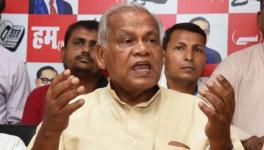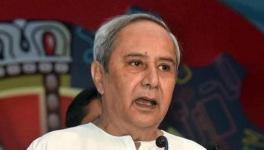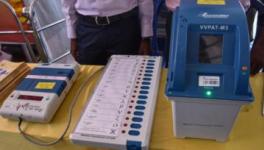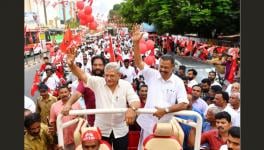A Budget With its Economics Completely Wrong
Newsclick talked to economist Smita Gupta on the Union Budget 2017.The economic survey reports an increase in unutilised capacity, job-losses and a recessionary condition in the economy.The whole country has been hit bad by demonetisation. There has been deep crisis. An expansionary budget was in order. This is a contractionary budget! At a time when just the opposite was required, the government has brought down the expenditures from 13.4% of the GDP to 12.7% of the GDP.
Rough Transcript:
Ambedkar: Welcome to Newsclick. We have with us Smita Gupta, an economist, to talk to us about the budget 2017. What is your overall reaction to the budget?
Smita Gupta: The budget is very disappointing. It’s a budget which is a contractionary budget at a time when something totally different was required. In that sense it’s a budget which has its economics completely wrong. If you look at the economic survey which the government itself tables, it reports a huge increase in unutilized capacity, it reports job losses; it reports a recessionary condition in the economy as a whole and a decline in the aggregate demands. Demonetisation has only made it worse and has actually made a very cash driven economy, really, really cash strapped. Which means the informal sector, the unorganised sector; people working there are in deep crisis. At a time such as this, where you have a neutralized capacity, you have excess labour in the market and you have your 40 million tons of food stocks, your current account deficit is very comfortable, you’ve good foreign exchange reserves. At a time like this, we would have expected actually an expansionary budget. That the government would go ahead with a lot of expenditure, reduce the slack in the system; there were huge scopes for slack reduction and in that way generate aggregate demand and economic growth. But at the moment with this low economic growth, what has the government done? It’s actually brought down fiscal deficit; it has brought down the budgetary support as the ratio of the GDP. It has come down from an already low 13.4% to 12.7%. So the overall support of the budget has come down. In addition to that, it has actually increased the burdens on the people.
Ambedkar: How do you see the thrust of the budget, given that there are elections in 5 states?
Smita: Actually, I had expected and as had everybody else, that’s why we were all alarmed as to why they had pre-poned the budget. So, it was a general expectation that preponing the budget before the U.P. and other elections meant that there would be a, what people call a populist budget. But what we would expect to be a good expansionary budget with a lot of expenditure on the rural development etc. but they haven’t done any of that. So, even in terms of its politics, it’s quite confounding. You know, if I was a bJP candidate contesting an election from U.P. I would be a very worried person today.
Ambedkar: Why do you think that the budget is smaller compared to the previous budget?
Smita: Well, it has been smaller mainly because of its adherence to neo-liberal policies. You see the whole idea is to have consolidation. Even at a time like this, the obsession is to keep the fiscal deficit low. Also, you know the whole approach towards fiscal management and the whole approach towards the resource mobilization is an impediment in itself. If you’re unwilling to tax the rich, you’re unwilling to tax the corporates; in fact you give them a tax holiday, you give them tax concessions. You’d be surprised to know that in this budget too, we have almost 2.1% of the budget which is given away as gifts to the corporate sector. At the same time, apart from the tom-tomming of the Rs. 20,000 crore reliefs to the income tax payer, there’s an attempt to get Rs. 200,000 crores as taxes. Of this Rs. 200,000 crores, about Rs. 75,000 crores is indirect taxes. Now, who pays indirect taxes? It’s well known they’re regressive in nature. The burden falls disproportionately on the poor and the working people. But even the estimate of Rs. 1.3 lakh crores from the rich or from income tax payers is a gross over estimate. You can’t believe it, it’s laughable. Why? Because the assumption of GDP growth is over 11% when the economic survey itself brings it down closer to 6% – 6.5%. And yet, all the tax buoyancy figures, all the tax estimates are on the basis of a very unrealistic GDP growth figure. Therefore, this budget is unbelievable, in terms of its projections, its numbers and it’s going to be really, perhaps a slightly higher fiscal deficit or worse, a big cut in expenditure as we go ahead.
Ambedkar: The budget claims that there’s going to be affordable housing for the poor. Your take on the issue.
Smita: You know this business of affordable housing, we need to unpack it, and you have to look at it more carefully, because actually what have they done? They have changed the definition of infrastructure by including affordable housing in it. This is something we’ve been resisting. We’ve been fighting and the peasant movement in the country has actually been very worried about the kind of things that are included in infrastructure. Why? Because what this means is that the moment you make affordable housing a part of infrastructure, land acquisition becomes easier, it becomes a part of priority sector lending so credit becomes available, much cheaper credit becomes available. And the moment you actually redefine the size of the housing itself by making it larger, as they have done, what you do is you try to create profits for the real estate sector and you also try to create a housing bubble. And that housing bubble is then pushed to show that the economy is doing very well.
Ambedkar: The previous budget talks about doubling farmer’s income and your overall take on the agrarian sector.
Smita: You know that is where we were really expecting. Why? Because we’ve had two consecutive years of drought, net sown area has come down, there have been floods in many parts of the country and on top of that, demonetisation actually caused a huge crisis at the time of sowing. People have lost jobs; people have migrated back from urban areas to rural areas. So there was a big expectation that rural development, agriculture would receive a lot of government attention and the government has really failed the farmers. There has actually been a decline in the contribution to the agricultural sector as a share of total budget outlay. The so called increase in MNREGA is an abysmal Rs. 500 crore increase from what it spent last year. And in any case, MNREGA is a demand driven law, it’s not anybody’s gift, it’s a demand driven program so whatever demand there is, they have to give that work. Therefore in sum, when it comes to agriculture and when it comes to the rural sector, the budget more than disappoints. It actually adds to people’s burdens.
Ambedkar: So do you mean to say that there have been no concrete steps taken to address the farmer’s crisis affecting our country?
Smita: I would say that in fact the opposite. What has been happening is that the agrarian sector, the rural sector has actually borne the biggest brunt of the crisis in the economy; the recession, the joblessness and the withdrawal of public services.
Ambedkar: Now the budget has actually done away with the planning component, so has there been any change in the allocation for SC, STs in this budget?
Smita: You see this budget has done two things for the first time. One is to present the railway budget along with the general budget and then said that infrastructure expenditure has really gone up. Whereas, actually there has been no real increase in infrastructure expenditure. But when it comes to tribal sub plan and SC, ST that is for the scheduled caste, it is mandated; it is a statutory requirement that the shares given out of planned funds would be in proportion to the population shares. It has not happened actually. Every year there has been a huge shortfall. This year, less than 1.5% of the overall budget has been allocated for the welfare of STs and less than 2.5% of the overall budget has been allocated for the welfare of SCs. Now you can imagine how abysmal and low that amount is. So even if the plan and non plan distinction is done away with, even as a share of the total budget, it’s so small. Furthermore there are other problems. When it comes to these two hits, one of them is that a lot of that money is actually spent on other things. It’s diverted away from what it’s meant to be spent on.
Ambedkar: The budget specially focuses on curbing black money and also illegal funding for political parties. Do you have to say anything on this?
Smita: Well, they have said that the amount of donations that can be given in cash are now down to Rs. 2,000. But till you put a ceiling on the expenditure of political parties and stop corporate funding of elections, how are you going to stop the use of black money? Changing the amount of cash that can be given is not going to make any difference; it’s an irrelevant issue actually.
Ambedkar: Do you want to talk about the provision for having bonds, where people can buy bonds in form of shares for political parties and the political parties can claim it later?
Smita: This RBI bonds, you know buying it from there or giving it directly by cheque, that really doesn’t make much of a difference. That’s neither here or there, that’s just some amount of I suppose publicity. The real thing that they need to do, if they want to control black money in elections is to actually put a ceiling on the expenditure of political parties themselves and to stop corporate funding of elections.
Ambedkar: Now, coming to the social sector, can you throw some light on education and health sector as well?
Smita: You know it’s quite shocking, education and health are supposed to be the two sectors about which this government’s claimed that it’s going to do a lot. But there’s barely been any increase and in some of the heads there’s actually been a decline. At a time when we want to universalize education, universalize health care, at such a time to do this is actually quite criminal. It also comes on the heels of a change in the sharing pattern of expenditure between states and the centre. So at this time actually for the centre to cut down or not increase its allocations is going to be terrible from the point of view of health and educational outcomes.
Ambedkar: Thank you very much Smita, we’ll talk to you on other issues soon. Thank you.
Disclaimer: Please note that transcripts for Newsclick are typed from a recording of the program. Newsclick cannot guarantee their complete accuracy.
Get the latest reports & analysis with people's perspective on Protests, movements & deep analytical videos, discussions of the current affairs in your Telegram app. Subscribe to NewsClick's Telegram channel & get Real-Time updates on stories, as they get published on our website.
























